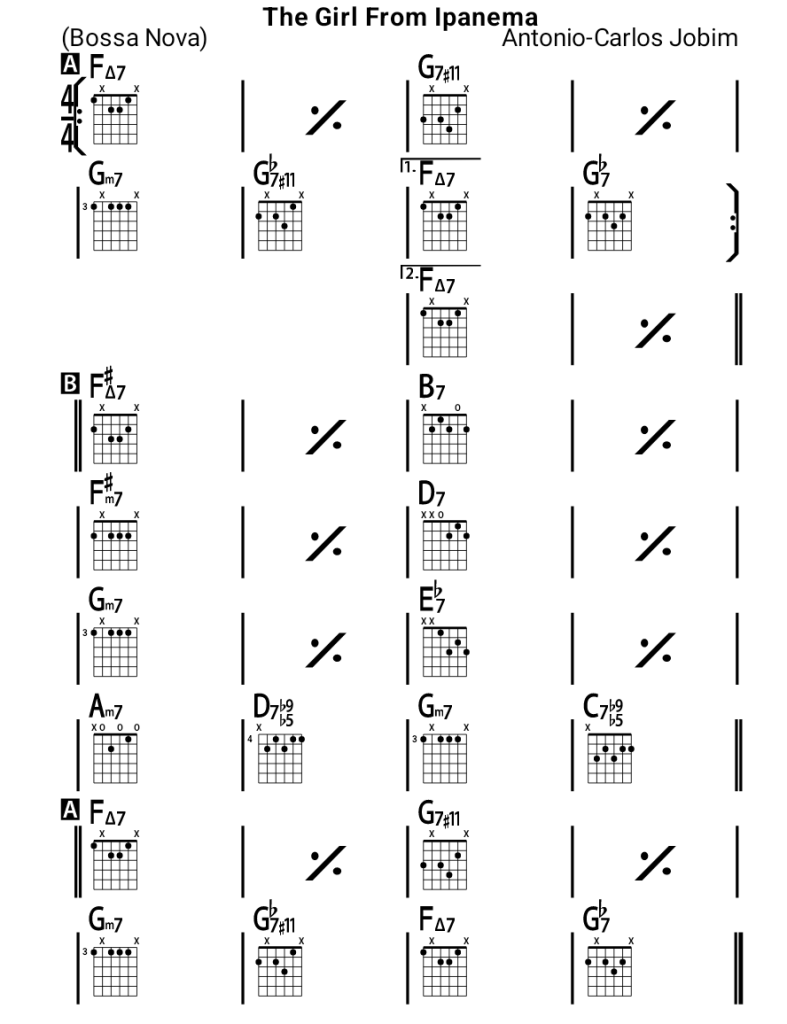The Girl from Ipanema
“Garota de Ipanema”, or “The Girl from Ipanema”, is a Brazilian bossa nova and jazz song. It was a worldwide hit in the mid-1960s and won a Grammy for Record of the Year in 1965. It was written in 1962, with music by Antônio Carlos Jobim and Portuguese lyrics by Vinícius de Moraes, with English lyrics written later by Norman Gimbel.
The first commercial recording was in 1962 by Pery Ribeiro. The Stan Getz recording, featuring the vocal debut of Astrud Gilberto, became an international hit. This version had been shortened from the version on the album Getz/Gilberto (recorded in March 1963, released in March 1964), which had also included the Portuguese lyrics sung by Astrud’s then-husband João Gilberto. In the US, the single peaked at number five on the Billboard Hot 100, and went to number one for two weeks on the Easy Listening chart. Overseas it peaked at number 29 on the UK singles chart, and charted highly throughout the world.
History
The song was composed for a musical comedy titled Dirigível (“Airship”), then a work in progress of Vinicius de Moraes. The original title was “Menina que Passa” (“The Girl Who Passes By”); the first verse was different. Jobim composed the melody on his piano in his new house in Rua Barão da Torre, in Ipanema. Moraes wrote the lyrics in Petrópolis, near Rio de Janeiro, as he had done with “Chega de Saudade” (“No More Blues”) six years earlier. While firmly rooted in bossa nova, “The Girl from Ipanema” includes influences from blues and Tin Pan Alley.
During a recording session in New York with João Gilberto, Antônio Carlos Jobim and Stan Getz, the idea of cutting an English-language version came up. Norman Gimbel wrote the English lyrics. João’s wife, Astrud Gilberto, was the only one of the Brazilians who could speak English well, and was chosen to sing. Her voice, without any of the mannerisms of trained singers, proved a perfect fit for the song. However, she was never credited or received any royalties, and received only $120 for her part.
The key the song is played in has varied depending upon the origin of the recording. While the original Ribeiro version was in the key of G, most Brazilian performances use D♭ and most American versions use F. Astrud Gilberto and Getz appear as themselves and perform the song in the 1964 film Get Yourself a College Girl.
Frank Sinatra recorded the song with Jobim in 1967 for their album Francis Albert Sinatra & Antônio Carlos Jobim. Ella Fitzgerald recorded it for her two-disc set of Brazilian music Ella Abraça Jobim, released by Pablo Today in 1981. Ethel Ennis and Nat King Cole have also both recorded the song.
Lyrics – Click to open
Portuguese
Olha, que coisa mais linda
Mais cheia de graça
É ela, menina, que vem e que passa
Num doce balanço, a caminho do mar
Moça do corpo dourado
Do sol de Ipanema
O seu balançado
É mais que um poema
É a coisa mais linda que eu já vi passar
Ah, por que estou tão sozinho?
Ah, por que tudo é tão triste?
Ah, a beleza que existe
A beleza que não é só minha
Que também passa sozinha
Ah, se ela soubesse
Que quando ela passa, o mundo sorrindo
Se enche de graça e fica mais lindo
Por causa do amor
English
Tall and tan and young and lovely
The girl from Ipanema goes walking
And when she passes
Each one she passes goes – ah
When she walks, she’s like a samba
That swings so cool and sways so gentle
That when she passes
Each one she passes goes – ooh
(Ooh) But I watch her so sadly
How can I tell her I love her
Yes I would give my heart gladly
But each day, when she walks to the sea
She looks straight ahead, not at me
Tall, (and) tan, (and) young, (and) lovely
The girl from Ipanema goes walking
And when she passes, I smile
But she doesn’t see (doesn’t see)
(She just doesn’t see, she never sees me…)
iReal Chart – Click to Open
